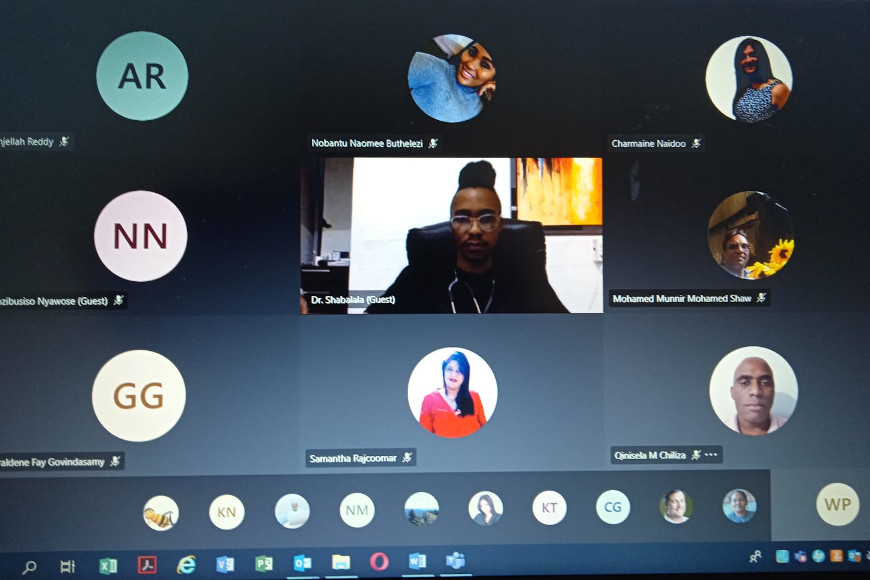The Durban University of Technology’s (DUT’s) Employee Wellness Programme hosted an online webinar on: Managing Your Sexual health and Well-Being on Microsoft Teams, last Thursday, 26 November 2020.
The online webinar was attended by the DUT community and included guest speakers, Clinical and Consulting psychologist, Nozibusiso Nyawose, also known for her work on the DStv programme named Utatakho; and Dr Nkosinathi E Shabalala, who is currently employed by the University of KwaZulu-Natal (Department of Family Medicine) as a sessional medical lecturer.
Dr Shabalala is also a Dispensing Procedural General Practitioner, who has also been successfully running two medical practices, in the Durban CBD and the suburb of Bellair.
Welcoming the guest speakers and the DUT community to the online webinar was DUT Employee Wellness Manager, Samantha Rajcoomar, who indicated that talking about one’s sexual health can be very challenging and a sensitive topic.
“Sexual health requires a positive and respectful approach. The past decade has seen growing attention in the area of a sexually healthy society invoking values of respect and choice. Remember that sexual health is a vital part of our overall wellness, and the way in which we take care of yourself sexually can have a major difference in your quality of life,” she said.
Rajcoomar said questions pertaining to good sexual health, maintaining a healthy body, having a satisfying sex life, valuing and having satisfying relationships, were vital questions that one needed to ask one’s self.
“It is important that we avoid sexually transmitted diseases, unplanned pregnancies, abuse, etc, and time to get smart about your body and protect it. Choose partners that treat you well, speak openly to your health care provider and partner about your sexual health. and get regular sexual health care,” she stressed.
Psychologist Nyawose focused more on what sexual health incorporates, saying that its one being comfortable with one’s body, and sexuality. “Sexual education is important, and the ways in which sex is discussed in society and what we are taught varies. It differs from culture to culture,” she said.
She also mentioned that it was important to eradicate stereotypes on sex and sexual orientation, and aim to promote healthy, sexual behaviours. Nyawose talked on sexual rights, adding that everyone has the right to make decisions for one’s self and not one’s partner. “Sexual health is a duty and the responsibility of learning about your body which is crucial,” she said.
Another important factor she spoke about was on becoming comfortable with one’s sexuality, and key to reach one’s sexual potential regardless of a person’s age. She mentioned the significance of body image and self- esteem which cannot be separated; and the constant pressure to fit into the ideals of beauty as defined by society.
“The most important relationship is the one you have with yourself. We have to end the constant pursuit of perfection,” she said.
Adding to the conversation Dr Shabalala spoke on how medical conditions such as diabetes, can affect and impact on sexual health, especially in men. He also spoke on the fact that everyone whether they are young or old, needs a platform where they can learn about sexual health. “We also need to educate ourselves, we also need information so that we know exactly what we intend to pass onto our children, because we need to create that platform as adults, for the young ones to be able to ask questions. This is so that they are able to talk about what they have encountered in terms of sexual health and what problems they are encountering in sexual health as well,” he said.
Attendees were also given an opportunity to ask questions pertaining their sexual health such as pap smears, UTI issues, impotence and what steps can be taken to curb those risks.
In closing, Rajcoomar thanked the attendees and guest speakers for taking time out to speak on such a vital topic, and urged everyone to embrace their sexuality. “Let your love, affection and intimacy contribute to your healthy relationships and individual well-being,” she said.
Pictured: Attendees at the Managing Your Sexual health and Well-Being webinar.
Waheeda Peters


